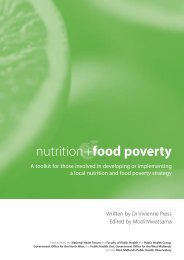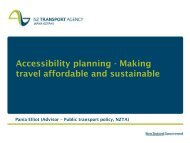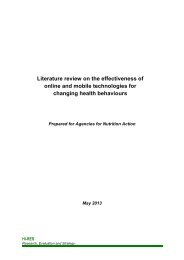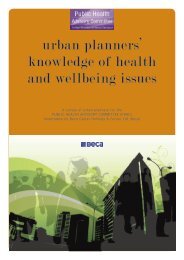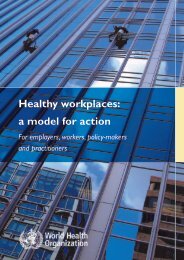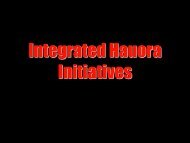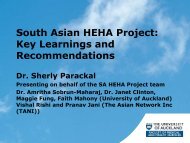enhancing food security and physical activity for maori, pacific and ...
enhancing food security and physical activity for maori, pacific and ...
enhancing food security and physical activity for maori, pacific and ...
- No tags were found...
You also want an ePaper? Increase the reach of your titles
YUMPU automatically turns print PDFs into web optimized ePapers that Google loves.
Enhancing Food Security <strong>and</strong> Physical Activity <strong>for</strong> Māori, Pacific <strong>and</strong> Low-income Peoplesbuilding initiatives. However, key stakeholders urged this development in ENHANCEworkshops.Key components <strong>for</strong> effectivenessThere are limited data on the effectiveness of building capacity in New Zeal<strong>and</strong>. This isdue in part to the inconsistency in work<strong>for</strong>ce data <strong>and</strong> a general lack of timelyin<strong>for</strong>mation to in<strong>for</strong>m long-term work<strong>for</strong>ce planning <strong>and</strong> trend analysis. Notwithst<strong>and</strong>ingthis, the following approaches have been highlighted from the New Zeal<strong>and</strong> literature <strong>for</strong>effective capacity development.• Establishing strong links within the community.• A collaborative community participatory approach.• Early, meaningful <strong>and</strong> ongoing engagement with community leaders <strong>and</strong> diversestakeholder advisory groups.• Education <strong>and</strong> training to provide the requisite knowledge <strong>and</strong> skills to initiateprogrammes, compete <strong>for</strong> funding, <strong>and</strong> develop effective knowledge translationstrategies. Undergraduate <strong>and</strong> graduate-level training <strong>for</strong> Māori <strong>and</strong> Pacificpeople is critical, <strong>and</strong> more opportunities <strong>for</strong> people to obtain some <strong>for</strong>m ofpractical experience are essential. Research <strong>and</strong> policy practicums wouldsupport trainees to more fully develop the skills required <strong>for</strong> health services <strong>and</strong>policy work.• Mentoring strategies are critical in helping develop capacity <strong>and</strong> increase thequality <strong>and</strong> rigour of future <strong>and</strong> existing programmes. Opportunities to workalongside programme leaders, senior researchers, etc., both on-site <strong>and</strong> bydistance provide a venue <strong>for</strong> discussing ways to balance research with teaching,clinical <strong>and</strong> administrative dem<strong>and</strong>s, <strong>and</strong> developing supervisory skills.• Strengthening existing networks is critical.• Those working in culturally-specific programmes require access to basic researchinfrastructure (eg, computers, databases, personnel support etc.).• Private sources of funding also need to be tapped, <strong>and</strong> major funders of healthresearch need to be made aware of Māori <strong>and</strong> Pacific people’s rising capacity toundertake health services <strong>and</strong> policy-relevant research. Targeted funds <strong>for</strong>research should also be considered.• The ability to compete successfully <strong>for</strong> peer-reviewed research funds is fosteredby relevant practical experience.• Continued Māori <strong>and</strong> Pacific representation on advisory boards, <strong>and</strong> governingbodies where research funding priorities are determined is required.Potential side-effectsSimilar to the international literature, there are generally no anticipated side-effects ofdeveloping capacity. However, it is unethical to train people <strong>and</strong> then not provide support<strong>for</strong> them at the most basic level. There is a responsibility <strong>for</strong> organisations <strong>and</strong>communities to ensure that whoever is trained develops skills that can be supported bysustained work. To do otherwise would be a waste of resources, <strong>and</strong> potentiallyexacerbate inequitable distribution of these resources.Cost benefit analysisNo cost-benefit analyses were identified in New Zeal<strong>and</strong> literature.162



